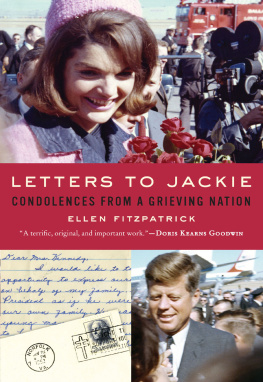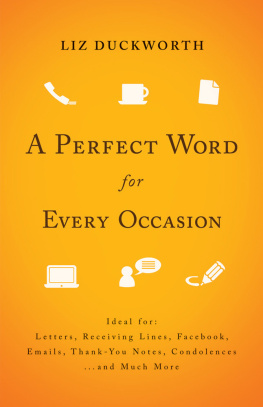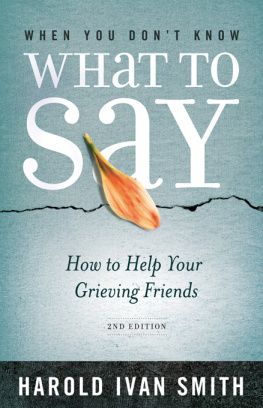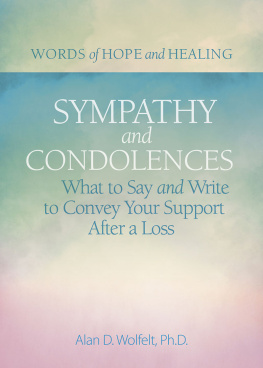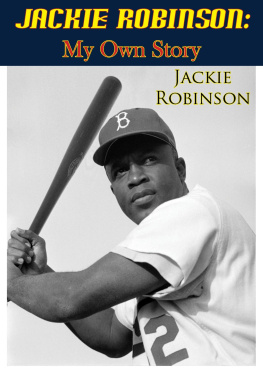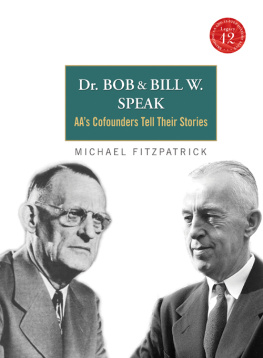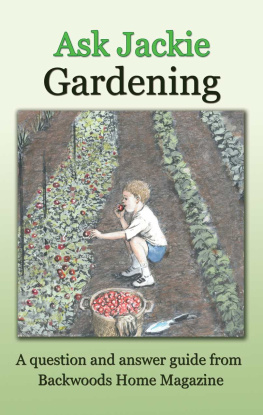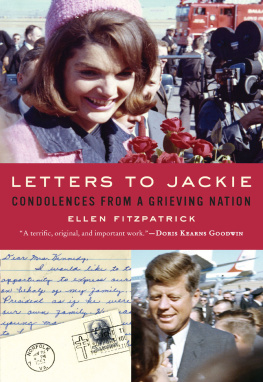Ellen Fitzpatrick - Letters to Jackie: Condolences from a Grieving Nation
Here you can read online Ellen Fitzpatrick - Letters to Jackie: Condolences from a Grieving Nation full text of the book (entire story) in english for free. Download pdf and epub, get meaning, cover and reviews about this ebook. year: 2010, publisher: HarperCollins, genre: Detective and thriller. Description of the work, (preface) as well as reviews are available. Best literature library LitArk.com created for fans of good reading and offers a wide selection of genres:
Romance novel
Science fiction
Adventure
Detective
Science
History
Home and family
Prose
Art
Politics
Computer
Non-fiction
Religion
Business
Children
Humor
Choose a favorite category and find really read worthwhile books. Enjoy immersion in the world of imagination, feel the emotions of the characters or learn something new for yourself, make an fascinating discovery.
- Book:Letters to Jackie: Condolences from a Grieving Nation
- Author:
- Publisher:HarperCollins
- Genre:
- Year:2010
- Rating:5 / 5
- Favourites:Add to favourites
- Your mark:
- 100
- 1
- 2
- 3
- 4
- 5
Letters to Jackie: Condolences from a Grieving Nation: summary, description and annotation
We offer to read an annotation, description, summary or preface (depends on what the author of the book "Letters to Jackie: Condolences from a Grieving Nation" wrote himself). If you haven't found the necessary information about the book — write in the comments, we will try to find it.
Letters to Jackie: Condolences from a Grieving Nation — read online for free the complete book (whole text) full work
Below is the text of the book, divided by pages. System saving the place of the last page read, allows you to conveniently read the book "Letters to Jackie: Condolences from a Grieving Nation" online for free, without having to search again every time where you left off. Put a bookmark, and you can go to the page where you finished reading at any time.
Font size:
Interval:
Bookmark:
For my remarkable mother,
Mary Callahan Fitzpatrick
A Deep Scar on Our Hearts

Gertrude McMurty to Mrs. John F. Kennedy, November 28, 1963, Adult Letters, box 11, folder 88, Condolence Mail, John F. Kennedy Presidential Library and Museum, Boston, Massachusetts (hereafter John F. Kennedy Library).
O n November 23, 1963, a day after the assassination of President John F. Kennedy, Katherine Dowd Jackson sat down in her home in rural North Carolina and took out her letter boxa cardboard suitcase where she kept white-lined paper and a pen for important occasions. Mrs. Jackson had a third-grade education, but she enjoyed writing. She was moved especially at this moment to express her deeply felt sentiments. Dear beloved one, she began her letter to Jacqueline Kennedy.
She wanted Mrs. Kennedy to know in the sad[d]ist moment of your Life you have my great symphy. I know you are suprized to know, Mrs. Jackson added, I am a Negro woman. An intensely religious person, Mrs. Jackson had drawn in the past twenty-four hours on her faith to make sense of the Presidents death. This marning God spoke to me, she confided. He had told her that the President had done for his Country what God did for his World[.] They killed our Lord an Father. an now they have killed our Presentend an Father. We loved him but God loved him best.
As Katherine Jackson carefully crafted her message to Mrs. Kennedy, thousands of Americans across the country were writing similar letters. What can anyone say at a time like this? asked one correspondent. Few had any answers but many felt an urge to sort out on paper the storm of emotion unleashed by the Presidents assassination. As no other First Family has done, you all have come into our homes and touched our personal lives, across the breadth of America. Your voices, your faces, your thoughts, your daily activitieswere personalized for us, one woman reflected.
Almost a half century later, the events of November 22, 1963, remain a vivid, searing memory for millions of Americans who still recall precisely where they were when they learned of the Presidents death. Kennedy served as President of the United States for little more than a thousand days. Yet his brief term in office and his shocking assassination deeply touched people of all walks of life, and of every social class, economic station, political sensibility, region, religion, and race. Whether they adored, were indifferent to, or frankly disliked JFK, countless Americans shared the feeling that their own lives would never be the same after their young President died so violently.
The nation has changed profoundly in the decades since President Kennedys death, as have the lives of all who remember those fateful days. Many of the schoolchildren who raced home on that Friday to discover grieving parents are grandparents today. The new generation of World War II veterans that Kennedys election brought to power has now reached old age. The Presidents two younger brothers, Senator Robert F. Kennedyhimself a victim of assassination in 1968and Senator Edward M. Kennedy, are both buried near their brother in Arlington National Cemetery. Wars have been fought. The scourge of legalized segregation has been repudiated. Access to fundamental political and civil rights has widened immeasurably. Fashions and mores of all kinds have changed. And yet for many Americans a filament of recollection easily brings back the incandescence of the early 1960s, when the nation appeared in some ways as bright and as full of promise as its handsome President. Millions still recall how in the passage of a single moment, much of the confidence, energy, and hopeful idealism that Kennedy appeared to exemplify were suddenly swept away. As one young mother predicted shortly after the assassination, Surely this generation has a deep scar on our hearts which we will carry to our graves.
That scar has inevitably faded in the nearly half century since the assassination. Time has dimmed once vivid memories of the nations first television Presidenta man whose verve, intelligence, humor, and grace captivated the public. The personal and political mythology burnished in the first years after the assassination have rightly given way in the ensuing decades to a much more complex view of President Kennedy and his administration. Indeed, the pendulum has swung so far in the direction of a more sober, more stark assessment of Kennedy that it is difficult to evoke today the soaring idealism, fresh hope, and sense of possibility that many Americans saw in him. Still, whatever historys judgments about the merits and consequences of those expectations, there can be little doubt that millions of Americans who lived through the Kennedy assassination felt that they had experienced a calamity that they would not forget.
A largely unexamined, and never before published, collection of letters to Jacqueline Kennedy stored in the John F. Kennedy Presidential Library vividly brings to life what the President and his death meant to thousands of Americans in the days and months following the assassination. How does a nobody write to the wife of our late President? asked one woman as she began a letter to Mrs. Kennedy four days after the death of JFK. In overcoming her hesitation, this letter writer resembled more than a million and a half other individuals who wrote messages of condolence to the former First Lady. The President died on a Friday afternoon at 12:30 p.m. Central Standard Time. The following Monday, mail delivery to the White House brought a mountain of letters45,000 on one dayfrom bereaved citizens, many of whom had sat down within minutes or hours of the assassination to share their grief, shock, and sense of outrage. Piled into cardboard boxes, and then stacked, these containers soon stretched from floor to ceiling, taking up space beyond the offices where social correspondence was normally handled and spilling out into the White House corridors. The volume of mail quickly overwhelmed Jacqueline Kennedys small White House staff, which was nonetheless instructed by the Pentagon to open every single item for security reasons. On one occasion, loud ticking from a package raised anxieties, until the box was found to contain a wind-up toy sent from Germany to three-year-old John F. Kennedy Jr.
Within seven weeks of the Presidents death, Jacqueline Kennedy had already received over 800,000 condolence letters. In a population of nearly 190 million, those who took the time to pen a letter to Mrs. Kennedy were clearly exceptional. But the sheer volume of mail, the rapidity with which their messages appeared, the extraordinary diversity of the letter writers, and the parallel manifestations of national grief and mourning evident in the country make the letters a notable element of the public response to the assassination. These individual expressions of grief offer in vivid detail aspects of the widespread reaction to President Kennedys death.
For millions of Americans, television provided a focal point for the shock, disbelief, grief, and even fears precipitated by the Kennedy assassination. From the moment CBS interrupted its regular television programming at 1:40 Eastern Standard Time on November 22 to report that shots had been fired at the Presidential motorcade in Dallas, the three major networks provided unprecedented news coverage of the assassinations aftermath. For four days they suspended their normal broadcasting and advertising in favor of nonstop coverage of the Presidents death, lying in state, funeral, and burial. Hungry for stories to fill airtime, the networks ran footage of Kennedys life and career in an endless loop along with live coverage of breaking events. Nothing comparable in the history of television had ever taken place. And then, on Sunday morning, millions of viewers witnessed in real time Jack Rubys murder of the Presidents assassin, as live television covered Lee Harvey Oswalds transfer from one Dallas jail to another. It was, the New York Times reported, the first time in 15 years of television around the globe that a real life homicide had occurred in front of live cameras. The Dallas shooting, easily the most extraordinary moments of TV that a set-owner ever watched, came with such breath-taking suddenness as to beggar description.
Font size:
Interval:
Bookmark:
Similar books «Letters to Jackie: Condolences from a Grieving Nation»
Look at similar books to Letters to Jackie: Condolences from a Grieving Nation. We have selected literature similar in name and meaning in the hope of providing readers with more options to find new, interesting, not yet read works.
Discussion, reviews of the book Letters to Jackie: Condolences from a Grieving Nation and just readers' own opinions. Leave your comments, write what you think about the work, its meaning or the main characters. Specify what exactly you liked and what you didn't like, and why you think so.

